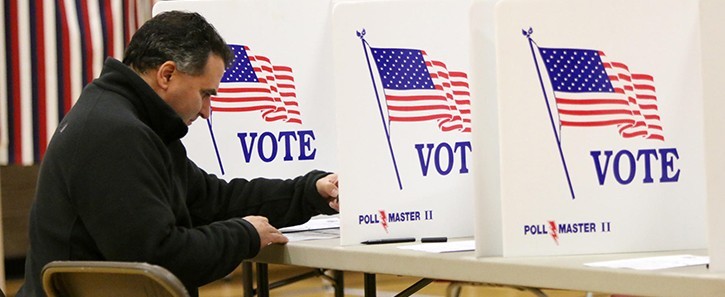

Judicial Watch Files Supreme Court Amicus Brief Supporting Ohio’s Process of Cleaning Voter Rolls


Sixth Circuit Ruling ‘Relies on Misuse of the Plain Language of the NVRA’
(Washington, DC) — Judicial Watch announced it has filed an amicus curiae brief in the U.S. Supreme Court asking the court to reverse a decision by the U.S. Court of Appeals for the Sixth Circuit, which had ruled that Ohio’s process for cleaning voter rolls was in violation of the National Voter Registration Act of 1993 (NVRA) (Jon Husted, Ohio Secretary of State v. Philip Randolph Institute, et al. (No. 16-980)).
According to Judicial Watch, “Ohio’s Supplemental Process allows the sending of a statutory confirmation notice to any registrant who has not had any voting-related activity for two years. After that, the registrant may be removed from the rolls if there is no response or further activity for two general federal elections.” The Sixth Circuit concluded that this amounted to removing a voter for failing to vote, which is forbidden by federal law.
But Judicial Watch, in its amicus brief to the Supreme Court, noted that “the failure to vote only leads to the sending of a notice. Subsequent removal is due to the failure to respond to that notice for a period of time that may extend up to four years. The Sixth Circuit’s attempt to argue otherwise relies on a misuse of the plain language of the NVRA.”
The amicus brief points out that the Sixth Circuit’s decision undermines a 2014 settlement agreement between Judicial Watch and Ohio, which required Ohio to contact inactive voters every year via a Supplemental Mailing to confirm they had not moved or died, as one of many steps to fulfill Ohio’s obligations under the NVRA to maintain the integrity of its voter list.
Judicial Watch argued it “never would have agreed to the settlement agreement with Ohio and dismissed its lawsuit if it believed the Supplemental Mailing was legally impermissible. If the Sixth Circuit’s ruling in this case is allowed to stand, this key provision of the settlement agreement could be voided. This would undermine Judicial Watch’s extensive efforts to protect the integrity of elections for its Ohio members.”
Additionally, Judicial Watch noted: “Congress, the Justice Department and 19 states have concluded that using the failure to vote as a basis for sending confirmation notices or taking other actions to remove voters is fully consistent with the NVRA.”
“There is no question about the importance of counting only the votes of eligible voters,” Judicial Watch President Tom Fitton said. “The Supreme Court should reverse the Sixth Circuit decision and allow Ohio to continue to work toward clean and fair elections.”
The amicus brief was submitted by Robert Popper, director of Judicial Watch’s Election Integrity Project. Popper was formerly Deputy Chief of the Voting Section of the Civil Rights Division of the Justice Department.
Popper has also joined with five other former attorneys of the Civil Rights Division of the Justice Department to file an amicus curiae brief in the Husted case. In their brief, Popper and his associates argue:
First, the Sixth Circuit’s interpretation of the NVRA conflicts with its text, structure, and history. Amici have long interpreted the statute oppositely, and they helped the Justice Department negotiate settlements that would be illegal under the Sixth Circuit’s view. [Emphasis added.] Second, the Sixth Circuit’s decision deprives Ohio and other jurisdictions of an important means to combat bloated voter rolls, a real and pressing threat to the integrity of federal elections.
###















